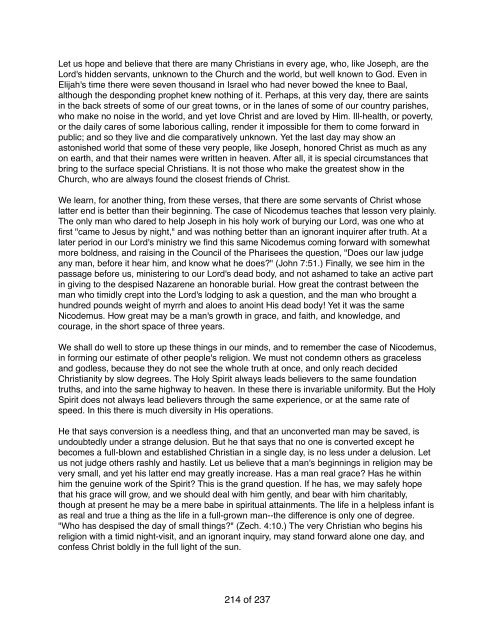J. C. Ryle John
John Charles Ryle (May 10, 1816 - June 10, 1900) was an evangelical Anglican clergyman and first Bishop of Liverpool. He was renowned for his powerful preaching and extensive tracts.
John Charles Ryle (May 10, 1816 - June 10, 1900) was an evangelical Anglican clergyman and first Bishop of Liverpool. He was renowned for his powerful preaching and extensive tracts.
Create successful ePaper yourself
Turn your PDF publications into a flip-book with our unique Google optimized e-Paper software.
Let us hope and believe that there are many Christians in every age, who, like Joseph, are the<br />
Lord's hidden servants, unknown to the Church and the world, but well known to God. Even in<br />
Elijah's time there were seven thousand in Israel who had never bowed the knee to Baal,<br />
although the desponding prophet knew nothing of it. Perhaps, at this very day, there are saints<br />
in the back streets of some of our great towns, or in the lanes of some of our country parishes,<br />
who make no noise in the world, and yet love Christ and are loved by Him. Ill-health, or poverty,<br />
or the daily cares of some laborious calling, render it impossible for them to come forward in<br />
public; and so they live and die comparatively unknown. Yet the last day may show an<br />
astonished world that some of these very people, like Joseph, honored Christ as much as any<br />
on earth, and that their names were written in heaven. After all, it is special circumstances that<br />
bring to the surface special Christians. It is not those who make the greatest show in the<br />
Church, who are always found the closest friends of Christ.<br />
We learn, for another thing, from these verses, that there are some servants of Christ whose<br />
latter end is better than their beginning. The case of Nicodemus teaches that lesson very plainly.<br />
The only man who dared to help Joseph in his holy work of burying our Lord, was one who at<br />
first "came to Jesus by night," and was nothing better than an ignorant inquirer after truth. At a<br />
later period in our Lord's ministry we find this same Nicodemus coming forward with somewhat<br />
more boldness, and raising in the Council of the Pharisees the question, "Does our law judge<br />
any man, before it hear him, and know what he does?" (<strong>John</strong> 7:51.) Finally, we see him in the<br />
passage before us, ministering to our Lord's dead body, and not ashamed to take an active part<br />
in giving to the despised Nazarene an honorable burial. How great the contrast between the<br />
man who timidly crept into the Lord's lodging to ask a question, and the man who brought a<br />
hundred pounds weight of myrrh and aloes to anoint His dead body! Yet it was the same<br />
Nicodemus. How great may be a man's growth in grace, and faith, and knowledge, and<br />
courage, in the short space of three years.<br />
We shall do well to store up these things in our minds, and to remember the case of Nicodemus,<br />
in forming our estimate of other people's religion. We must not condemn others as graceless<br />
and godless, because they do not see the whole truth at once, and only reach decided<br />
Christianity by slow degrees. The Holy Spirit always leads believers to the same foundation<br />
truths, and into the same highway to heaven. In these there is invariable uniformity. But the Holy<br />
Spirit does not always lead believers through the same experience, or at the same rate of<br />
speed. In this there is much diversity in His operations.<br />
He that says conversion is a needless thing, and that an unconverted man may be saved, is<br />
undoubtedly under a strange delusion. But he that says that no one is converted except he<br />
becomes a full-blown and established Christian in a single day, is no less under a delusion. Let<br />
us not judge others rashly and hastily. Let us believe that a man's beginnings in religion may be<br />
very small, and yet his latter end may greatly increase. Has a man real grace? Has he within<br />
him the genuine work of the Spirit? This is the grand question. If he has, we may safely hope<br />
that his grace will grow, and we should deal with him gently, and bear with him charitably,<br />
though at present he may be a mere babe in spiritual attainments. The life in a helpless infant is<br />
as real and true a thing as the life in a full-grown man--the difference is only one of degree.<br />
"Who has despised the day of small things?" (Zech. 4:10.) The very Christian who begins his<br />
religion with a timid night-visit, and an ignorant inquiry, may stand forward alone one day, and<br />
confess Christ boldly in the full light of the sun.<br />
214 of 237




